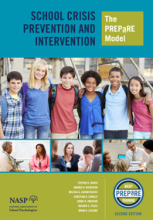The PREPaRE Model: 3rd Edition
About the PREPaRE Model
PREPaRE is a crisis prevention and intervention model that prepares educators and school-based mental health professionals to feel confident in their abilities when they fill specific roles and responsibilities during a crisis event.
PREPaRE focuses on the following activities:
- Prevent and prepare for crises
- Reaffirm physical health & welfare, and perceptions of safety & security
- Evaluate psychological trauma risk
- Provide interventions
- and
- Respond to mental health needs
- Examine the effectiveness of crisis preparedness
This model is informed by documents published by the U.S. Department of Education and Homeland Security. You can find these documents linked in the Additional Resources section below.
Workshop 1 is a one-day training for all staff. This workshop informs on how to build a school environment that focuses on comprehensive school safety efforts that encompass both physical and psychological safety. Participants will learn a brief overview of a school crisis team's roles and responsibilities, emphasizing crisis prevention and preparedness.
Workshop 2 is a two-day training for crisis response staff. This workshop provides specialized information on the roles and responsibilities of school-based mental health professionals, specifically during crisis intervention and recovery. Participants in this workshop will develop skills to provide the necessary immediate mental health crisis interventions to the students, staff, and school community members who have been simultaneously exposed to an acute traumatic stressor.
Request a PREPaRE workshop for your school or district by completing the PREPaRE Workshop Request Form.
The National Association for School Psychologists (NASP):
School Safety and Crisis Resources
U.S. Department of Education:
Guide for Developing High-Quality School Emergency Operations Plans
The Role of Districts in Developing High-Quality School Emergency Operations Plans
U.S. Department of Homeland Security:
National Incident Management System
School Crisis Prevention and Intervention: The PREPaRE Model by S. E. Brock et al., 2009, Bethesda, MD: NASP.








